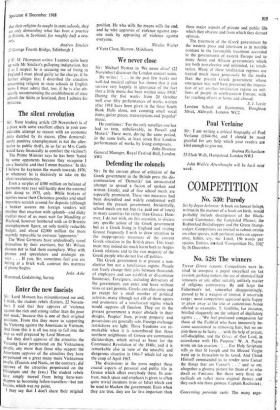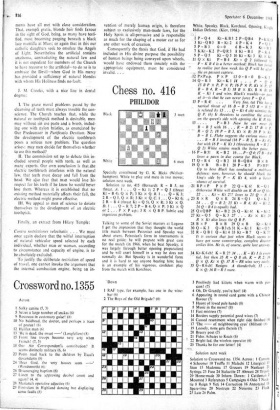No. 528: The winners
Trevor Grove reports: Competitors were in- vited to compose a papal encyclical on tax evasion, parking meters, the use of chemical hair removers or any other suitably unlikely matter of religious controversy. By and large the Fisherman's net, somewhat disappointingly, proved to be a weapon of limited, if uncertain range: most competitors appeared quite happy to gnaw away at the trio ot contentious bones offered as examples. T. Griffiths, for instance, bristled eloquently on the subject of depilatory agents . . . 'We feel profound compassion for those of the Faithful who have innocently be- come accustomed to removing hair, but we en- join them to be hairy. ... with the help of prayer, self-discipline, and the Gracc of Our Lord, in accordance with His Purpose.' W. A. Payne wrote on tax evasion : . . For Holy Scripture tells us that St Joseph and the Blessed Virgin wed' up to Jerusalem to be taxed. And Christ Himself commanded us to render unto Caesar the things that are Caesar's . . .' and so on; altogether a gloomy picture for those of us who dwell ex Vatican°. But there were three en- cyclicals on rather more original themes and they each win three guineas. Captain Rochester: Concerning peroxide curls: The many argu-
ments have all met with close consideration. That, exempli gratia, blonde hair finds favour in the sight of God, being, as many have testi- fied, most becoming peeping beneath a black lace mantilla at Mass; or again that in this our catholic daughters seek to emulate the Angels of Light. Nevertheless the artificial remitius anathema, contradicting the natural law and it is not expedient for members of the Church to have recourse to the artificial—to do so is to embrace the Devil—when God in His mercy has provided a sufficiency of natural blondes with whom His Holiness finds no fault.
J. M. Crooks, with a nice line in dental dogma :
I. The grave moral problems posed by the cleansing of teeth must always trouble the con- science. The Church teaches that, while the natural or toothpick method is desirable, men may without sin use paste and a brush, includ- ing one with nylon bristles, as enunciated by Our Predecessor in Purificatio Detilium. Now the development of the electric toothbrush poses a serious new problem. The question arises: may men decide for themselves whether to use this method?
H. The commission set up to debate this in- cluded several people with teeth, as well as many experts. Our own conclusion is that,,the electric toothbrush interferes with the natural law, that teeth must decay and fall from the head. We also fear that man would lose his respect for his teeth if he knew he would bever lose them. Whereas it is established that no existing method materially affects their fall, the electric method might prove effective.
• Ill. We appeal to men of science to devote themselves to the development of an electric toothpick.
Finally, an extract from Hilary Temple:
Contra restrictiones velocitatis: . . . We must once again declare that the wilful interruption of natural vehicular speed selected by each individual, whether man or woman, according to circumstance and capacity of engine, is to be absolutely excluded.
To justify the deliberate restriction of speed of travel, one cannot invoke the argument that the internal combustion engine, being an in-
vention of merely human origin, is therefore subject to exclusively man-made laws, for the Holy Spirit is all-pervasive and is responsible as much for the shaping of a motor car as for any other work of creation.
Consequently the thesis that God, if He had included in His divine purpose the possibility of human beings being conveyed upon wheels, would have endowed them innately with the appropriate equipment, must be considered invalid. . . .



































 Previous page
Previous page